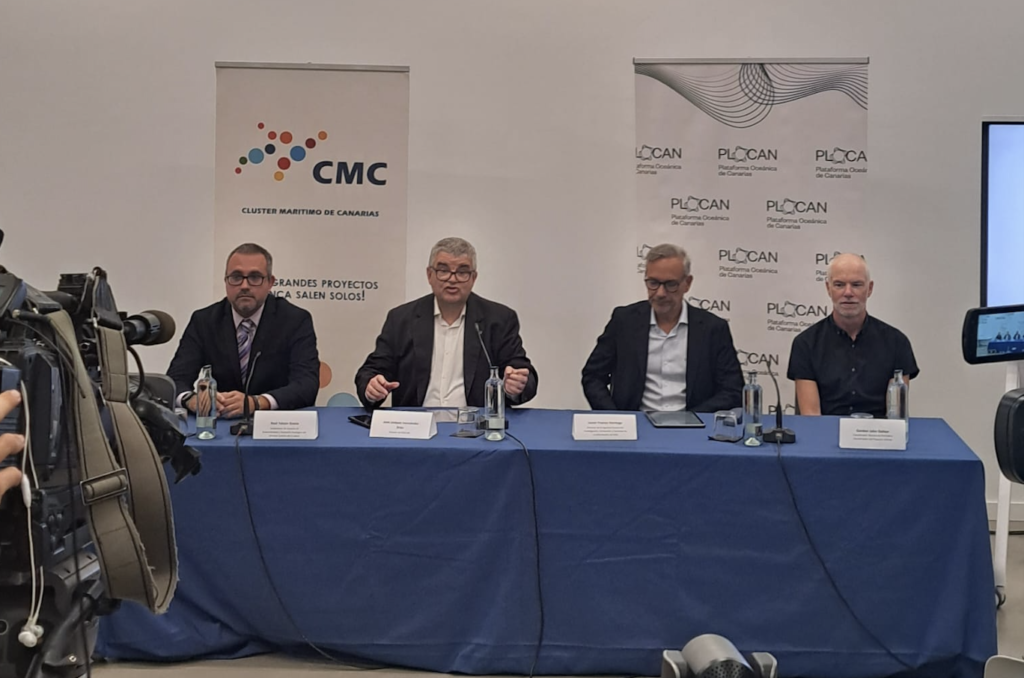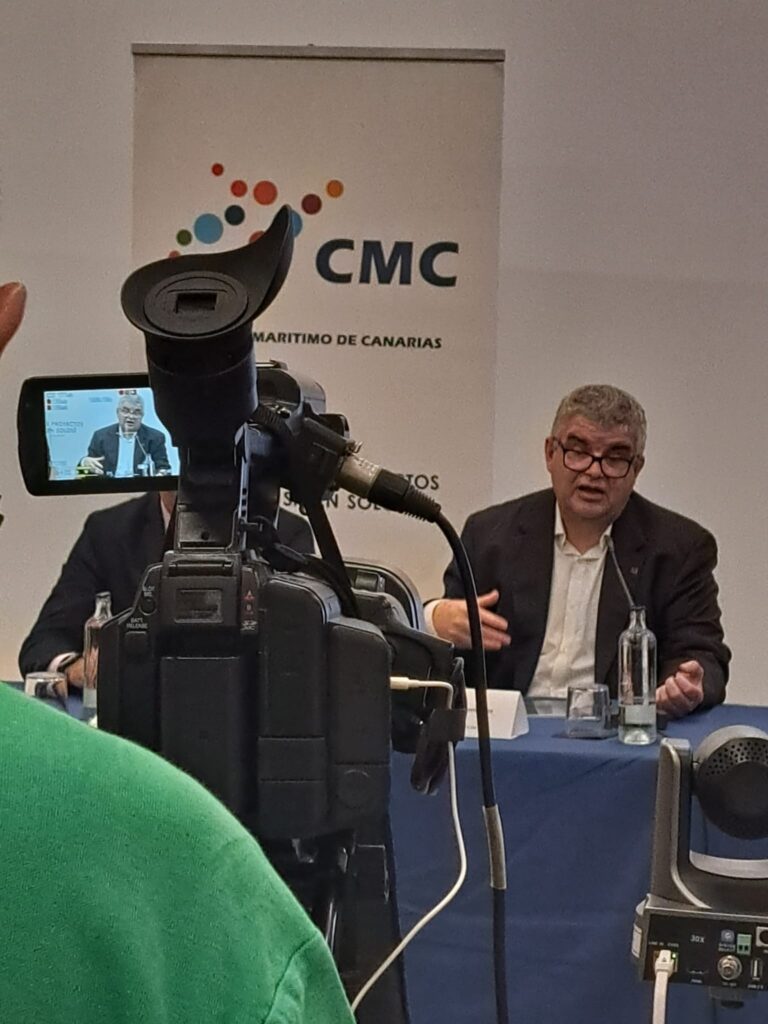
This is the first Press Conference
This is the first Press Conference https://h2-heat.eu/wp-content/uploads/2023/09/Screenshot-2023-10-03-at-15.45.30-1024x678.png 1024 678 H2Heat Project https://h2-heat.eu/wp-content/uploads/2023/09/Screenshot-2023-10-03-at-15.45.30-1024x678.pngPLOCAN leads the H2Heat project for the production and utilization of hydrogen for heating from marine renewable energy sources.
The Canary Islands Ocean Platform (PLOCAN) is at the forefront of a consortium comprising eleven institutions and companies from Spain, Ireland, the United Kingdom, Estonia, and Ukraine. This collaboration is aimed at developing a project known as H2Heat, focused on harnessing renewable marine resources to produce hydrogen for heating and electricity generation. The primary application will be at the Insular Maternal and Child Hospital Complex in Las Palmas de Gran Canaria.
The Panelists
Present at a press conference today were Javier Franco Hormiga, Director of the Canary Islands Agency for Research, Innovation, and Information Society (ACIISI); José Joaquín Hernández Brito, Director of PLOCAN; Raúl Falcón, Deputy Director of Sustainability Management and Ecological Transition at the Canary Islands Health Service (SCS); and Gordon Dalton, Coordinator of the European project “Innovative Production of Renewable Energy Vectors for Heating from Renewable Energies (H2Heat).” The project aims to utilize offshore wind energy to generate manageable green hydrogen for heat production, thereby reducing fossil fuel consumption and CO2 emissions.

The consortium participants have commenced a three-day work session for the project’s launch. With a budget of 13 million euros, of which 10 million is contributed by the European Union, and a duration of 5 years, the overarching goal is to demonstrate the complete value chain of green hydrogen (H2) heating for commercial buildings. These buildings are responsible for 40% of total energy consumption and 36% of greenhouse gas emissions in the EU, with 79% attributed to water heating and air conditioning.
“We will harness offshore wind energy from the ELICAN project to produce renewable, sustainable, and locally sourced hydrogen energy, from the oceans to hospitals,” emphasized Director of the ACIISI. He stressed the importance of renovating buildings to reduce energy consumption and emissions, as buildings surpass land transport in this regard.
The Director of PLOCAN expressed satisfaction with the substantial involvement of Canarian partners in the project and underscored the importance of testing various technologies related to the blue economy, ocean observation, biodiversity, and the digital transition in the Canary Islands, which will enhance competitiveness.
He also announced the plan to commence hydrogen production, ranging between 100 and 200 kilograms, by the end of 2025. He extended gratitude to the Canarian Health Service for their collaboration, as it plays a central role in the healthcare system’s green transition.
The Deputy Director of Sustainability Management and Ecological Transition of the SCS reaffirmed the Ministry of Health’s commitment to reducing polluting emissions into the atmosphere. “With the SCS’s participation in this project, we intend to position the public hospitals of the Canary Islands at the forefront of sustainability, as health systems are an integral part of society,” he stated.
In this context, Falcón highlighted that the Ministry of Health’s collaboration in this initiative aligns with the “Zero Net Emissions Health Strategy 2030,” which seeks to decarbonize the SCS through reducing the carbon footprint in the activities of healthcare services in the archipelago.
The H2Heat project, titled “Innovative Production of Renewable Energy Carriers for Heating from Renewable Energies,” introduces key innovations, including the production of highly combustible hydrogen using an innovative 1 MW electrolyser powered by marine renewable energy. It combines advanced combustion technology burners (cogeneration) designed for hydrogen operation with heat pumps, along with an infrastructure for transporting hydrogen from the production facility to the end user.
Renewable energy will be supplied by the Esteyco offshore wind turbine, the electrolyzer will be located at the EMALSA facilities in Jinámar, and the cogeneration burner and heat pump will be situated at the Complejo Hospitalario Insular Materno Infantil de Las Palmas de Gran Canaria (CHUIMI).
In collaboration with the Canarian Health Service (SCS), H2HEAT aims to demonstrate the complete utilization of green H2 for heating and, subsequently, energy. This will serve as a replicable model for all SCS hospitals, enabling the SCS to fulfill its “Zero Net Emissions 2030 Health Strategy” and achieve substantial decarbonization. The project introduces the concept of a “Hydrogen Valley” on the island of Gran Canaria, with plans for expansion throughout the archipelago.
The comprehensive and complementary combination of experience and knowledge brought by the consortium partners will ensure efficient achievement of the project’s technical objectives, reduce the cost of H2 fuel for consumers, and develop replicable business models for large-scale commercial use of H2 as an alternative to direct heating in Gran Canaria.
The partners of the H2Heat project include: PLOCAN; Esteyco Spain, specializing in fixed and floating wind turbines; Neodyne Ireland, responsible for electrical engineering and EMS control; Stargate Estonia, handling the electrolyser, compressor, and storage; 2G Spain, responsible for H2 cogeneration; ICoRSA Ireland, in charge of dissemination, communication, and public engagement; CMS Spain, engaged in public engagement in Gran Canaria; EMEC United Kingdom (Orkney Islands), contributing expertise in H2 distribution networks, business models, and techno-economics; SCS/CHUIMI Spain, representing the Canarian Health Service; Canarian Agency for Research, Innovation, and Information Society of the Government of the Canary Islands (ACIISI); and SPLP Ukraine, offering expertise in electrolyzer research.